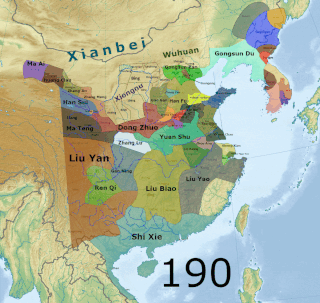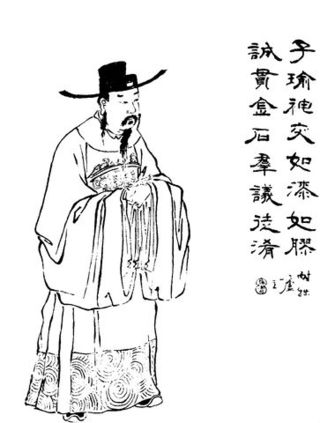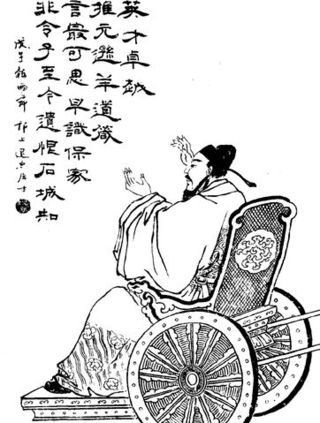
The Three Kingdoms from 220 to 280 AD was the tripartite division of China among the dynastic states of Cao Wei, Shu Han, and Eastern Wu. The Three Kingdoms period was preceded by the Eastern Han dynasty and was followed by the Western Jin dynasty. The short-lived state of Yan on the Liaodong Peninsula, which lasted from 237 to 238, is sometimes considered as a "4th kingdom".

Sun Quan, courtesy name Zhongmou (仲謀), posthumously known as Emperor Da of Wu, was the founder of the Eastern Wu dynasty, one of the Three Kingdoms of China. He inherited control of the warlord regime established by his elder brother, Sun Ce, in 200. He declared formal independence and ruled from November 222 to May 229 as the King of Wu and from May 229 to May 252 as the Emperor of Wu. Unlike his rivals Cao Cao and Liu Bei, Sun Quan was much younger than they were and governed his state mostly separate of politics and ideology. He is sometimes portrayed as neutral considering he adopted a flexible foreign policy between his two rivals with the goal of pursuing the greatest interests for the country.

Romance of the Three Kingdoms is a 14th-century historical novel attributed to Luo Guanzhong. It is set in the turbulent years towards the end of the Han dynasty and the Three Kingdoms period in Chinese history, starting in 184 AD and ending with the reunification of the land in 280 by the Western Jin. The novel is based primarily on the Records of the Three Kingdoms, written by Chen Shou in the 3rd century.

Sun Ce, courtesy name Bofu, was a Chinese military general, politician, and warlord who lived during the late Eastern Han dynasty of China. He was the eldest child of Sun Jian, who was killed during the Battle of Xiangyang when Sun Ce was only 16. Sun Ce then broke away from his father's overlord, Yuan Shu, and headed to the Jiangdong region in southern China to establish his own power base there. With the help of several people, such as Zhang Zhao and Zhou Yu, Sun Ce managed to lay down the foundation of the state of Eastern Wu during the Three Kingdoms period.

Han (漢; 221–263), known in historiography as Shu Han (蜀漢 ) or Ji Han (季漢 "Junior Han"), or often shortened to Shu (Chinese: 蜀; pinyin: Shǔ; Sichuanese Pinyin: Su2 < Middle Chinese: *źjowk < Eastern Han Chinese: *dźok), was a dynastic state of China and one of the three major states that competed for supremacy over China in the Three Kingdoms period. The state was based in the area around present-day Hanzhong, Sichuan, Chongqing, Yunnan, Guizhou, and north Guangxi, an area historically referred to as "Shu" based on the name of the past ancient kingdom of Shu, which also occupied this approximate geographical area. Its core territory also coincided with Liu Bang's Kingdom of Han, the precursor of the Han dynasty.

Wu, known in historiography as Eastern Wu or Sun Wu, was a dynastic state of China and one of the three major states that competed for supremacy over China in the Three Kingdoms period. It previously existed from 220 to 222 as a vassal kingdom nominally under Cao Wei, its rival state, but declared complete independence from Cao Wei in November 222. It was elevated to an empire in May 229 after its founding ruler, Sun Quan, declared himself emperor.

Zhuge Jin, courtesy name Ziyu, was a Chinese military general and politician of the state of Eastern Wu during the Three Kingdoms period of China. Born in the late Eastern Han dynasty, Zhuge Jin started his career in the 200s as an official under the warlord Sun Quan, who later became the founding emperor of Eastern Wu in the Three Kingdoms period. In 215, he served as Sun Quan's representative in a territorial dispute over southern Jing Province between Sun Quan and his ally, Liu Bei. In 219, he joined Sun Quan's general Lü Meng in an invasion of Liu Bei's territories in Jing Province after Sun Quan broke the Sun–Liu alliance. He was subsequently appointed as a general and commandery administrator. Before the Battle of Xiaoting of 221–222, Zhuge Jin attempted to dissuade Liu Bei from going to war with Sun Quan but was unsuccessful. The battle ultimately concluded with victory for Sun Quan's side; both sides made peace later and reestablished an alliance between the Eastern Wu and Shu Han states against their rival state, Cao Wei. From 222 until his death in 241, despite being rather incompetent in military affairs, Zhuge Jin served as one of Eastern Wu's top generals and participated in some battles against Cao Wei forces.

The Baiyue, Hundred Yue, or simply Yue, were various ethnic groups who inhabited the regions of Southern China and Northern Vietnam during the 1st millennium BC and 1st millennium AD. They were known for their short hair, body tattoos, fine swords, and naval prowess.

The military history of the Three Kingdoms period encompasses roughly a century's worth of prolonged warfare and disorder in Chinese history. After the assassination of General-in-chief He Jin in September 189, the administrative structures of the Han government became increasingly irrelevant. By the time of death of Cao Cao, the most successful warlord of North China, in 220, the Han empire was divided between the three rival states of Cao Wei, Shu Han and Eastern Wu. Due to the ensuing turmoil, the competing powers of the Three Kingdoms era found no shortage of willing recruits for their armies, although press-ganging as well as forcible enlistment of prisoners from defeated armies still occurred. Following four centuries of rule under the Han dynasty, the Three Kingdoms brought about a new era of conflict in China that shifted institutions in favor of a more permanent and selective system of military recruitment. This ultimately included the creation of a hereditary military class as well as increasing reliance on non-Chinese cavalry forces and the end of universal conscription.
Ling Tong (189–217), courtesy name Gongji, was a Chinese military general serving under the warlord Sun Quan during the late Eastern Han dynasty of China. He started his service under Sun Quan when he was still a teenager and, throughout his entire life, had been contributing to the foundation and solidification of the state of Eastern Wu, which Sun Quan established in 229. He fought in numerous battles for his lord, including those against Huang Zu, Liu Bei and the Shanyue tribes, but is best known for his performance in the campaigns against Sun Quan's archrival Cao Cao, in which he displayed great skill and tact in extremely adverse situations.
Han Dang, courtesy name Yigong, was a military general serving under the warlord Sun Quan during the late Eastern Han dynasty and early Three Kingdoms period of China. He previously served under Sun Quan's predecessors – Sun Jian and Sun Ce.

Zhuge Ke, courtesy name Yuanxun (元逊), was a Chinese military general and politician of the state of Eastern Wu during the Three Kingdoms period of China. He was the eldest son of Zhuge Jin, a military general who served under Wu's founding emperor, Sun Quan. After Sun Quan's death in 252, Zhuge Ke served as regent for Sun Quan's son and successor, Sun Liang, but the regency proved to be militarily disastrous due to Zhuge Ke's aggressive foreign policy towards Wu's rival state, Cao Wei. In 253, he was ousted from power in a coup d'état and killed along with his family.

Zhu Ran, born Shi Ran, courtesy name Yifeng, was a Chinese military general of the state of Eastern Wu during the Three Kingdoms period of China. Despite being a childhood friend of Wu's founding emperor, Sun Quan, he was never given an important position or assignment before Lü Meng's invasion of southern Jing Province in 219, wherein he assisted in capturing the enemy commander, Guan Yu. Following the Battle of Xiaoting, Wu's rival state, Cao Wei, launched a three-pronged strike on Wu's northwestern, middle, and eastern borders. Zhu Ran was sent to the northwestern border, where he defended the city of Jiangling with only 5,000 troops against an enemy force about ten times greater. He rose to fame and became feared throughout Wei. He then participated in a series of military operations against Wei, during which he defeated several enemy units, but the overall objectives were never met. Before his death, Zhu Ran was granted authority to oversee matters within the army.
Zhang Cheng (178–244), courtesy name Zhongsi, was a military general of the state of Eastern Wu during the Three Kingdoms period of China.
Quan Cong, courtesy name Zihuang, was a Chinese military general of the state of Eastern Wu during the Three Kingdoms period of China. Born in present-day Hangzhou towards the end of the Eastern Han dynasty, Quan Cong became famous at a young age when he performed acts of charity by giving grain to people suffering from famine and providing shelter to refugees from central China. He started his career under the warlord Sun Quan as a military officer and achieved success in his early career by pacifying the restive Shanyue tribes in the Jiangdong territories. After Sun Quan became an independent ruler of Wu in 222, Quan Cong rose to the rank of General and participated in battles against Wu's rival state Wei. He also pacified rebellions by local tribes in Danyang, Wu and Kuaiji commanderies. After Sun Quan became emperor in 229, Quan Cong married his daughter Sun Luban and became one of his most trusted generals. During this time, although he was less active in battles, he became more outspoken on state affairs. He strongly objected to Sun Quan's decision to let his heir apparent Sun Deng lead troops into battle because it was against traditions, and attempted to dissuade Sun Quan from launching an invasion of Zhuya and Yizhou. Towards the end of his life, he became embroiled in a power struggle between Sun Quan's sons Sun He and Sun Ba over the succession to their father's throne. Although he supported Sun Ba, he died before he could see the power struggle end in 250 with neither Sun He nor Sun Ba becoming the new heir apparent. Throughout his life, Quan Cong was known for being a respectful and agreeable man who remained humble despite his high social status and prestige. As a military commander, he was known for being courageous and decisive, and for conducting himself with dignity and often taking the bigger picture into consideration.
Chen Biao, courtesy name Wen'ao, was an official and military general of the state of Eastern Wu during the Three Kingdoms period of China.

The Chu Shi Biao refers to either of two memorials written by Zhuge Liang, the Imperial Chancellor of the state of Shu during the Three Kingdoms period of China. He presented them to Liu Shan, the second emperor of Shu. The first Chu Shi Biao, which is referred to as the "Former Chu Shi Biao", was presented in 227 before Zhuge Liang embarked on the first of a series of military campaigns against Shu's rival state, Wei. The second, known as the "Later Chu Shi Biao", was supposedly submitted in 228 before Zhuge Liang left for the second Northern Expedition.
Tang Zi was a military general of the state of Eastern Wu during the Three Kingdoms period (220–280) of China. In 258, he defected to Wu's rival state, Cao Wei, and became a general under Wei.
The Battle of Xiakou was a battle fought between the warlords Sun Quan and Liu Biao in 203 in the late Eastern Han dynasty. Sun Quan's forces attempted to conquer Jiangxia Commandery, which was defended by Liu Biao's general, Huang Zu. The battle was inconclusive as Sun Quan's forces were unable to capture Jiangxia even when Huang Zu retreated. The battle is not to be confused with the Battle of Jiangxia that took place five years later, which concluded with victory for Sun Quan over Huang Zu.
Gu Cheng, courtesy name Zizhi, was a military general of the state of Eastern Wu during the Three Kingdoms period of China.










